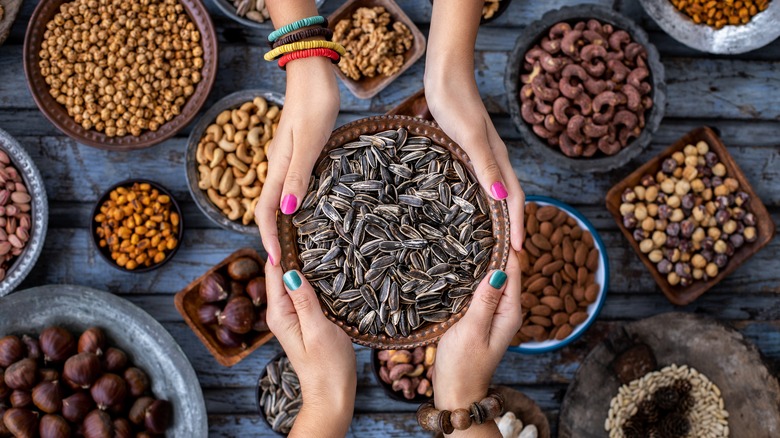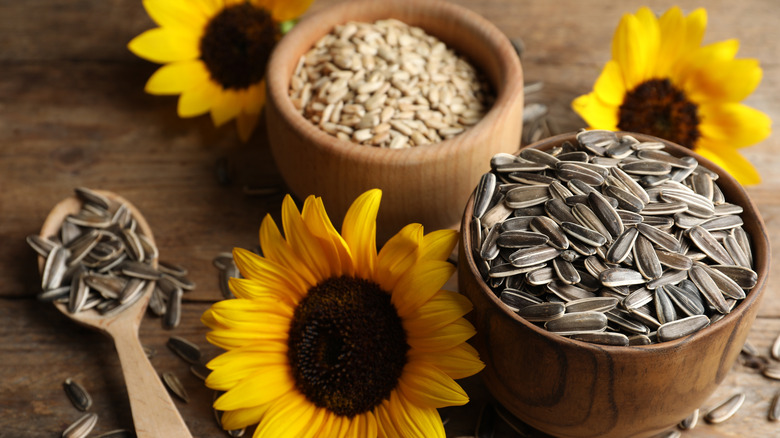Unexpected Side Effects Of Eating Sunflower Seeds
Dry roasted or raw, sunflower seeds are both delicious and nutritious. Whether you prefer to crack open the shell with your teeth or pop them unshelled into your mouth, these tiny white seeds pack a powerful punch. They have a tender texture and a nutty aroma. And, they're harvested from the happiest flower plant, the sunflower. If that doesn't scream eat me, these unexpected health benefits surely will.
Sunflower seeds are notoriously rich in fats, proteins, and vitamins. Reaching for a 1-ounce serving of toasted, yet unsalted seeds is 175 calories, according to the U.S. Department of Agriculture (USDA). It contains 4.88 grams of protein, 3.9 grams of fiber, and 16.1 grams of fat. But that's not all it contains. Sunflower seeds are also rich in iron, copper, vitamin Bs, vitamin E, potassium, and phosphorus. Vitamin E in particular is extremely powerful. This nutrient, along with other plant compounds and flavonoids, gives sunflower seeds their anti-inflammatory powers, shares a 2017 study. But so does the fat.
According to Eat This, Not That!, these seeds contain a hearty dose of polyunsaturated and monounsaturated fats. This, consequently, adds to the seed's effectiveness in reducing inflammation. Let's not forget zinc and selenium, the immune-boosting vitamins (via WebMD). And, sunflowers seeds are loaded with each. Selenium wards off infection and inflammation, while zinc supports the production and management of immune cells.
Sunflower seeds boost energy and heart health
What's even more impressive is the vitamins and minerals found in sunflower seeds boost heart health. One study found that eating 30 grams of sunflowers everyday for 3 weeks can lower systolic blood pressure and reduce "bad" LDL cholesterol in women with type 2 diabetes. The investigators reported that participants experienced a reduction in bad cholesterol by 9% and 12%, while the decline in systolic blood pressure was slightly lower at 5% (via Healthline). But how? Well, certain compounds like magnesium may be to thank, as they help relax blood vessels and reduce blood pressure. Another 2018 study praises chlorogenic acid, a plant compound that improves glucose metabolism. It's important to note participants in the study also followed a recommended healthy diet.
In addition, sunflower seeds offer some seriously energizing benefits. The rich vitamin B and protein content in these seeds can enhance energy levels, while selenium can improve oxygen flow, points out WebMD.
Expectant parents are also likely to find some phenomenal health perks. An article in Eating Well says sunflower seeds are rich in essential prenatal vitamins which support fetus growth and development. These vitamins include folate, zinc, and vitamin E.
All in all, sunflower seeds have a lot of health benefits to offer. Sprinkle them on salads, toss them in a smoothie, or eat them by the spoonful as a nut butter. Just be sure to keep an out for added salt, additives, and hidden sugars.


